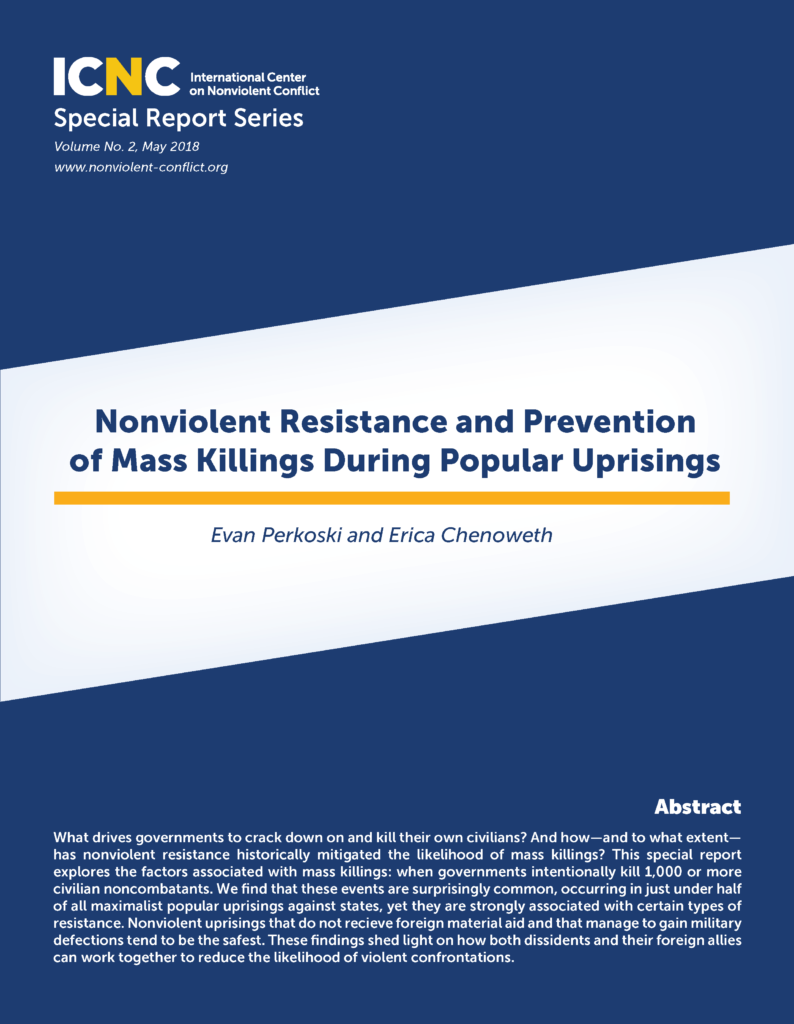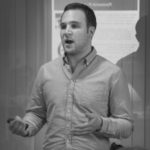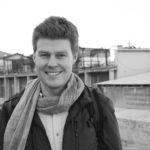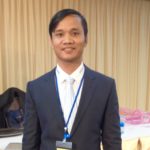We Shall Overcome… Our Frustration First
Delivering the Story: Why Movement Reporting Matters
Why Violence Undermines Protest
Let’s Get Real! Facing Up to the Agent Provocateur Problem
Madagascar: No Defection Too Small, No Act of Resistance Too Isolated
Uprooting Corruption in Uganda: Protest or Persuasion?
Nonviolent Resistance and Prevention of Mass Killings During Popular Uprisings
By Evan Perkoski and Erica Chenoweth, May 2018
Free Download
Purchase a Print Copy
Purchase e-book (Nook | Kindle)

What drives governments to crack down on and kill their own civilians? And how—and to what extent—has nonviolent resistance historically mitigated the likelihood of mass killings? This special report explores the factors associated with mass killings: when governments intentionally kill 1,000 or more civilian noncombatants. We find that these events are surprisingly common, occurring in just under half of all maximalist popular uprisings against states, yet they are strongly associated with certain types of resistance. Nonviolent uprisings that do not receive foreign material aid and that manage to gain military defections tend to be the safest. These findings shed light on how both dissidents and their foreign allies can work together to reduce the likelihood of violent confrontations.
 Dr. Evan Perkoski is an assistant professor in the Department of Political Science at the University of Connecticut. His research focuses on the dynamics of rebel, insurgent, and terrorist groups; strategies of violent and nonviolent resistance; and the behavior of state and nonstate actors in cyberspace. His book manuscript explores the breakdown of armed organizations, focusing particularly on the emergence of splinter groups and how they behave relative to their predecessors. He received his PhD from the University of Pennsylvania and has held fellowships at the Belfer Center for Science and International Affairs at the Harvard Kennedy School of Government as well as the Josef Korbel School of International Studies at the University of Denver.
Dr. Evan Perkoski is an assistant professor in the Department of Political Science at the University of Connecticut. His research focuses on the dynamics of rebel, insurgent, and terrorist groups; strategies of violent and nonviolent resistance; and the behavior of state and nonstate actors in cyberspace. His book manuscript explores the breakdown of armed organizations, focusing particularly on the emergence of splinter groups and how they behave relative to their predecessors. He received his PhD from the University of Pennsylvania and has held fellowships at the Belfer Center for Science and International Affairs at the Harvard Kennedy School of Government as well as the Josef Korbel School of International Studies at the University of Denver.
 Dr. Erica Chenoweth is a Professor at the Josef Korbel School of International Studies at the University of Denver. Foreign Policy magazine ranked her among the Top 100 Global Thinkers of 2013 for her work to advance the empirical study of civil resistance. Her book, Why Civil Resistance Works (Columbia University Press, 2011) with Maria J. Stephan, also won the 2013 Grawemeyer Award for Ideas Improving World Order. Chenoweth has authored or edited four books and dozens of articles on political violence and its alternatives. She earned a PhD and an MA from the University of Colorado and a BA from the University of Dayton.
Dr. Erica Chenoweth is a Professor at the Josef Korbel School of International Studies at the University of Denver. Foreign Policy magazine ranked her among the Top 100 Global Thinkers of 2013 for her work to advance the empirical study of civil resistance. Her book, Why Civil Resistance Works (Columbia University Press, 2011) with Maria J. Stephan, also won the 2013 Grawemeyer Award for Ideas Improving World Order. Chenoweth has authored or edited four books and dozens of articles on political violence and its alternatives. She earned a PhD and an MA from the University of Colorado and a BA from the University of Dayton.
Check out the related ICNC Webinar
How Can Resistance Movements Limit Mass Killings By Repressive Governments?
Date: June 20, 2018
Presenter: Evan Perkoski
Civil Resistance: A First Look
Does Protesting Do Any Good?
Curriculum Fellowship Awardees 2017
In 2014, ICNC launched the Curriculum Fellowship Program to support development of courses on nonviolent conflict and promote teaching in the growing field of civil resistance studies by selecting seven curriculum fellows. In both 2015 and 2016 ICNC accepted six fellows. In 2016, ICNC added a new component to the curriculum support program, online courses that interested fellows taught in 2016 and Spring 2017. The online teaching became an integral part of the initiative and the 2017 cohort of fellows will continue teaching both classroom-based and online courses on civil resistance.
ICNC is excited to continue the Curriculum Fellowship Program by accepting seven fellows for the 2017 cohort. These fellows will be teaching in person courses in Kenya, the United States, and Finland. Online courses will be taught in Hong Kong, Armenia, and Cambodia.
The 2017 Fellows are:
Solomon Onyango
Tyler Dale Hauger
Bunly Soeung
Hasan Habes
Johnson Ching-Yin Yeung
Lusine Arakelyan
Lilit Makunts
 Solomon Onyango received his Bachelor in Social Sciences & his Masters in Public Administration and Management from Makerere University in Kampala, Uganda. He is currently a lecturer of Political Science at the Catholic University of Eastern Africa (CUEA) and a PhD candidate with the Social Transformation (Governance and Democracies) Department at Tangaza University College in Nairobi, Kenya. His doctoral dissertation, “Strengthening Accountability through Deliberative Citizen Participation in Sub-National Government” seeks to examine the nexus between deliberative citizen participation and accountability at the sub-national government level in Lamu County, Kenya. Solomon’s teaching and research is anchored in a multi-disciplinary intersection of governance, democratization and decentralization within Africa. He regularly teaches core topical courses on Public Administration, Democracy and Governance, and Social & Public Policy in Africa. Solomon also holds distinguished awards from the South-South Institute and the Democratic Governance Institute of the Council for the Development of Social Science Research in Africa.
Solomon Onyango received his Bachelor in Social Sciences & his Masters in Public Administration and Management from Makerere University in Kampala, Uganda. He is currently a lecturer of Political Science at the Catholic University of Eastern Africa (CUEA) and a PhD candidate with the Social Transformation (Governance and Democracies) Department at Tangaza University College in Nairobi, Kenya. His doctoral dissertation, “Strengthening Accountability through Deliberative Citizen Participation in Sub-National Government” seeks to examine the nexus between deliberative citizen participation and accountability at the sub-national government level in Lamu County, Kenya. Solomon’s teaching and research is anchored in a multi-disciplinary intersection of governance, democratization and decentralization within Africa. He regularly teaches core topical courses on Public Administration, Democracy and Governance, and Social & Public Policy in Africa. Solomon also holds distinguished awards from the South-South Institute and the Democratic Governance Institute of the Council for the Development of Social Science Research in Africa.
Course Title: Theory and Practice of Non-Violent Resistance in East Africa
Location: Institute of Regional Integration and Development (IRID) at the Catholic University of Eastern Africa (CUEA), Nairobi, Kenya (August-December 2017)
Course Abstract: In this course, participants will become familiar with nonviolent resistance, from the era of colonial and post-colonial Africa to the Arab Spring. It will explore facets of nonviolent resistance as a proven social action movement capable of destabilizing colonies, establishing independent states or toppling rogue regimes and recasting the geopolitical landscape in East Africa. It will explore questions surrounding the ethics of nonviolent action, when and where civil resistance is used, the conditions under which it is more or less effective, and its consequences for local communities, state polities and the international system. The course will draw from seminal philosophical texts, historical accounts and cutting-edge social science research. Students will gain an understanding of both the normative and empirical debates surrounding the practice of civil resistance and a familiarity with key cases within and outside the East Africa. The course will cover major topics related to the general field of civil resistance as well as case studies specific to East Africa and Kenya.
Solomon’s course evaluation and learning assessment
 Tyler Dale Hauger is a visiting faculty member at St. Olaf College in Northfield, MN, USA in January 2018. He works full-time as an advisor at Karibu Foundation in Oslo, Norway, an organization that supports civil society movements in Global South that lift up alternatives to the dominant paradigms of power, distribution, and development. Tyler holds a M.Phil. in Peace and Conflict Studies from the University of Oslo (2011), as well as a B.A. in Political Science and Religion from St. Olaf College (2008). His interests and research areas include international relations, conflict resolution & reconciliation, economic globalization & trade regimes, social movements, nonviolent action strategies, and ecumenism & interfaith initiatives. He has previously served with the LWF’s Department for World Service’s Jerusalem office in East Jerusalem, and he currently sits on the board of the Norwegian Social Forum- the Norwegian arm of the World Social Forum.
Tyler Dale Hauger is a visiting faculty member at St. Olaf College in Northfield, MN, USA in January 2018. He works full-time as an advisor at Karibu Foundation in Oslo, Norway, an organization that supports civil society movements in Global South that lift up alternatives to the dominant paradigms of power, distribution, and development. Tyler holds a M.Phil. in Peace and Conflict Studies from the University of Oslo (2011), as well as a B.A. in Political Science and Religion from St. Olaf College (2008). His interests and research areas include international relations, conflict resolution & reconciliation, economic globalization & trade regimes, social movements, nonviolent action strategies, and ecumenism & interfaith initiatives. He has previously served with the LWF’s Department for World Service’s Jerusalem office in East Jerusalem, and he currently sits on the board of the Norwegian Social Forum- the Norwegian arm of the World Social Forum.
Course Title: Political Science 231: Peace and Nonviolent Resistance
Location: St. Olaf College, Minnesota, USA
Course Abstract: The course will explore central theories and perspectives associated with peace, conflict reconciliation, and nonviolent resistance with perspectives from the Nordic countries and around the globe. What lessons can be learned from actors that are struggling nonviolently for individual and collective rights, social and economic justice, and a collective responsibility for coming generations? What key strategies are individuals and groups using in their struggle to create a just community and world? How do groups and individuals approach reconciliation and forgiveness in post-conflict situations? The course will approach these subjects from an academic perspective, that of people’s movements in the field, and through interactive skill trainings that will occur each week. The civil resistance unit of the course will include focus on political power; the strategic nature of civil resistance and peacebuilding, including looking at the pillars of support, broad-based coalition building, and potential allies; how one designs an effective civil resistance campaign that will also ensure a democratic result in the future, beyond just regime change; and issues such as provocateurs, the radical flank / violent effect, as well as topics such as participation and backfire. As a final project, students (in groups) will select one cause which they find personally engaging, and using both class material as well as outside sources, design a strategy for civil resistance and change. Both the theoretical premises and the mechanisms that link the explanatory factors to decisions on power and peace will be discussed in the course.
Tyler’s course evaluation and learning assessment
 Bunly Soeung is a full-time lecturer of public administration at Svay Rieng University, Cambodia. He has also worked as a freelance research coordinator for peace research projects. He received his master’s degree in Public Administration with a focus on Public Policy in 2010 from Universitas Padjadjaran, Indonesia. Between 2013 and 2015, he was a peace research team member for the Alliance for Conflict Transformation. In 2015, he finished a master program in Higher Education at the University of Hong Kong, focusing on students’ perspective on freedom of critical inquiry in Cambodia. In 2016, he translated a 160-page book entitled “May 18 Gwangju Democratic Uprising” about the May 18th Foundation in South Korea. His primary research interests are cultural peace-building, non-violent civil resistance in Cambodia, and academic freedom. Recently, his co-authored journal article on “The Revitalisation of Buddhist Peace Activism in Post-War Cambodia” was published in the Conflict, Security & Development Journal, Volume 17. It examines how Cambodian Buddhist monks develop and maintain their normative legitimacy and connection with civilian followers by focusing on their approaches to four types of resources: religious authority, cultural knowledge, social networks, and new communication technology.
Bunly Soeung is a full-time lecturer of public administration at Svay Rieng University, Cambodia. He has also worked as a freelance research coordinator for peace research projects. He received his master’s degree in Public Administration with a focus on Public Policy in 2010 from Universitas Padjadjaran, Indonesia. Between 2013 and 2015, he was a peace research team member for the Alliance for Conflict Transformation. In 2015, he finished a master program in Higher Education at the University of Hong Kong, focusing on students’ perspective on freedom of critical inquiry in Cambodia. In 2016, he translated a 160-page book entitled “May 18 Gwangju Democratic Uprising” about the May 18th Foundation in South Korea. His primary research interests are cultural peace-building, non-violent civil resistance in Cambodia, and academic freedom. Recently, his co-authored journal article on “The Revitalisation of Buddhist Peace Activism in Post-War Cambodia” was published in the Conflict, Security & Development Journal, Volume 17. It examines how Cambodian Buddhist monks develop and maintain their normative legitimacy and connection with civilian followers by focusing on their approaches to four types of resources: religious authority, cultural knowledge, social networks, and new communication technology.
Course Title: An Introduction to Civil Resistance and Nonviolent Movements
Location: ICNC Online Platform
Course Abstract: This 5-week online course is designed to take participants through a guided progression of ideas, topics, and themes in the field of civil resistance and nonviolent movements. In particular, it examines the foundation of civil resistance, deconstructing misconceptions and structural determinism, strategy and tactics of nonviolent struggle, backfire and depression, gender dynamics, and civil resistance and corporate governance in the extractive industries in both theory and practice. The participants will be introduced to case studies of Cambodian nonviolent movements and will look at common misconceptions about civil resistance including its neglect in history and previous civil movements in Cambodia, such as the Buddhist nationalist movement under the French colonialism, Maha Ghosananda’s Dhammayietra and others. The aim of this course is not only to educate students about civil resistance and nonviolent movements that has never been introduced to any academic curriculum, but also to inspire students to see how powerful the nonviolent movements are.
Bunly’s course evaluation and learning assessment.
 Hasan Habes is an educator, activist and researcher. He is currently a Ph.D. candidate and a lecturer in Peace, Mediation and Conflict Research Program at Åbo Akademi University in Vaasa, Finland and holds a Master’s degree from the same university. He specializes in nonviolent discipline and his research examines how to transform the radical flanks’ violent behaviors to nonviolent ones in Turkey. In addition, he has a MA degree in international relations concentrating on “the impact of education in conflict resolution in Cyprus” from Eastern Mediterranean University, Cyprus.
Hasan Habes is an educator, activist and researcher. He is currently a Ph.D. candidate and a lecturer in Peace, Mediation and Conflict Research Program at Åbo Akademi University in Vaasa, Finland and holds a Master’s degree from the same university. He specializes in nonviolent discipline and his research examines how to transform the radical flanks’ violent behaviors to nonviolent ones in Turkey. In addition, he has a MA degree in international relations concentrating on “the impact of education in conflict resolution in Cyprus” from Eastern Mediterranean University, Cyprus.
He was actively involved in the Gezi resistance in Turkey in 2014 and his master’s dissertation focused on the identification and elimination of the radical flanks during a nonviolent action. In it, he proposed policy recommendations to the organizers and practitioners how to keep the nonviolent discipline during nonviolent action campaigns.
Course Title: Civil Resistance
Location: Peace, Mediation & Conflict Research Program at Åbo Akademi University in Vaasa, Finland
Course Abstract: The aim of the course is to introduce the main concepts and ideas of civil resistance and discuss various historical and contemporary cases of nonviolent campaigns and movements. The students will explore some of the common misconceptions about nonviolent struggles as well as strategies and tactics. In this way the students will learn to distinguish strategy from tactics and they will be able to relate these in the context of civil resistance. Also, students will discover how the external actors play a significant role to facilitate and support these movements. By the end of the course, the students will be able to analyze the core elements of civil resistance movements and reflect on the effectiveness of these movements and their underlying political power. The students will be able to have a better understanding of the impact of violent flanks on the nonviolent action campaigns and the importance of the nonviolent discipline. Also, the students will learn and understand about different ways that movements can fail, the causes as well as the possible alternative strategies to prevent these failures. The course will provide an interactive and structured classroom based learning environment with the activating methods techniques. So the students can become more informed observers of nonviolent conflicts and effective conveyors of civil resistance knowledge.
Hasan’s course evaluation and learning assessment
 Johnson Ching-Yin Yeung is a young human right activist in Hong Kong and former Hurford Youth Fellow at the National Endowment for Democracy. He graduated with a Master of Laws in Human Rights from the University of Hong Kong. He was the spokesman of Civil Human Rights Front, a Hong Kong civil rights alliance, and was Deputy Secretary of The Federation of Students, the leading group of the 2014 Umbrella Movement.
Johnson Ching-Yin Yeung is a young human right activist in Hong Kong and former Hurford Youth Fellow at the National Endowment for Democracy. He graduated with a Master of Laws in Human Rights from the University of Hong Kong. He was the spokesman of Civil Human Rights Front, a Hong Kong civil rights alliance, and was Deputy Secretary of The Federation of Students, the leading group of the 2014 Umbrella Movement.
Course Title: Strategic Civil Resistance Movements for Democracy and Self-Determination: Lessons for Asian Organizers
Location: ICNC Online Platform
Course Abstract: Democracy and civil liberties have faced great challenges since the third wave of democratization in Asia. Faced with improved repressive tactics used by authoritarian government against dissents and activists, this course aims at equipping activists with adequate knowledge on nonviolent civil resistances, such as the basic concept of nonviolent civil resistances, mobilization skills, power structure analysis, and strategic planning. The course is also aimed at the obstacles and challenges of civil resistance movement in theoretical framework, such as backfire theory, radical flank and military suppression. Developed by an organizer of the 2014 Umbrella Movement, this curriculum is tailored for young Asian activists who have experiences of organizing and mobilizing. Additional cases studies in Asia will be explored in order to fit the target audiences. This course is formulated in an interactive manner, students are encouraged to play stimulation games, participate into breakout discussion group, slack discussion and group learning circles. .
 Lusine Arakelyan is a founding member of the NGO Civil Consciousness. Currently she is also their Coordinator of Educational Affairs. Her bachelor’s degree is in Linguistics and Communication,with a specialization in Political Science. In 2015 she graduated from the Center for European Studies at Yerevan State University, where she was awarded the Master’s Degree of European Studies. As part of the Master’s program, she also studied at Ivane Javakhishvili Tbilisi State University. In 2012, she participated in the Brusov Student Movement, which was the first large-scale students’ movement organized in Armenia. Nonviolent action was the key element of success. After the foundation of Civil Consciousness, she has spent the last five years coordinating more than 100 non-formal education projects.
Lusine Arakelyan is a founding member of the NGO Civil Consciousness. Currently she is also their Coordinator of Educational Affairs. Her bachelor’s degree is in Linguistics and Communication,with a specialization in Political Science. In 2015 she graduated from the Center for European Studies at Yerevan State University, where she was awarded the Master’s Degree of European Studies. As part of the Master’s program, she also studied at Ivane Javakhishvili Tbilisi State University. In 2012, she participated in the Brusov Student Movement, which was the first large-scale students’ movement organized in Armenia. Nonviolent action was the key element of success. After the foundation of Civil Consciousness, she has spent the last five years coordinating more than 100 non-formal education projects.
 Lilit Makunts is currently an Associate Professor at the Russian-Armenian University in Yerevan. She earned her Ph.D. in Cognitive Linguistics specializing in Political Discourse. She teaches Sociolinguistics, Cognitive Linguistics, Discourse Analysis, and History of Nonviolent Resistance. After attending the Fletcher Summer Institute for the Advanced Study of Nonviolent Conflict in 2015, she initiated an academic course on Civil Resistance in the Department of Political Science in the fall of 2016. After about 8 years as a political board member in the Liberal Party of Armenia and the head of the youth organization (2004-2012) she realized that, without civic education and the acknowledgment of people power movements among society, no substantial democratic changes can take place. Along with academic teaching, she works as a trainer on different civil society platforms.
Lilit Makunts is currently an Associate Professor at the Russian-Armenian University in Yerevan. She earned her Ph.D. in Cognitive Linguistics specializing in Political Discourse. She teaches Sociolinguistics, Cognitive Linguistics, Discourse Analysis, and History of Nonviolent Resistance. After attending the Fletcher Summer Institute for the Advanced Study of Nonviolent Conflict in 2015, she initiated an academic course on Civil Resistance in the Department of Political Science in the fall of 2016. After about 8 years as a political board member in the Liberal Party of Armenia and the head of the youth organization (2004-2012) she realized that, without civic education and the acknowledgment of people power movements among society, no substantial democratic changes can take place. Along with academic teaching, she works as a trainer on different civil society platforms.
Course Title: Nonviolent Struggle: Why and How It Works
Location: ICNC Online Platform
Course Abstract: This is an online seminar that aims at providing civil society representatives, political activists, trainers of non-formal education and students seeking knowledge of nonviolent strategies in civil resistance. Within the framework of the seminar, the concept of nonviolent civil resistance, its most successful practices around the world, and the reasons of why and how it works will be thoroughly introduced. The course will begin with the introduction of civil resistance, its historical background and will dwell upon the common misconceptions. It will discuss the mechanisms of movement mobilization and formation as well as the factors of its sustainability. It will further discuss strategic frameworks for analyzing campaigns and movements as well as will explore issues of innovative and creative tactical choice. The importance of a well planned civil resistance will also be touched upon together with the long-lasting impact of civil resistance and its costs. The cases of various civil resistance movements in the Post-Soviet region and the main factors of instigation will also be discussed. It will focus on what can be done to make those efforts of civil resistance more strategic and effective.
